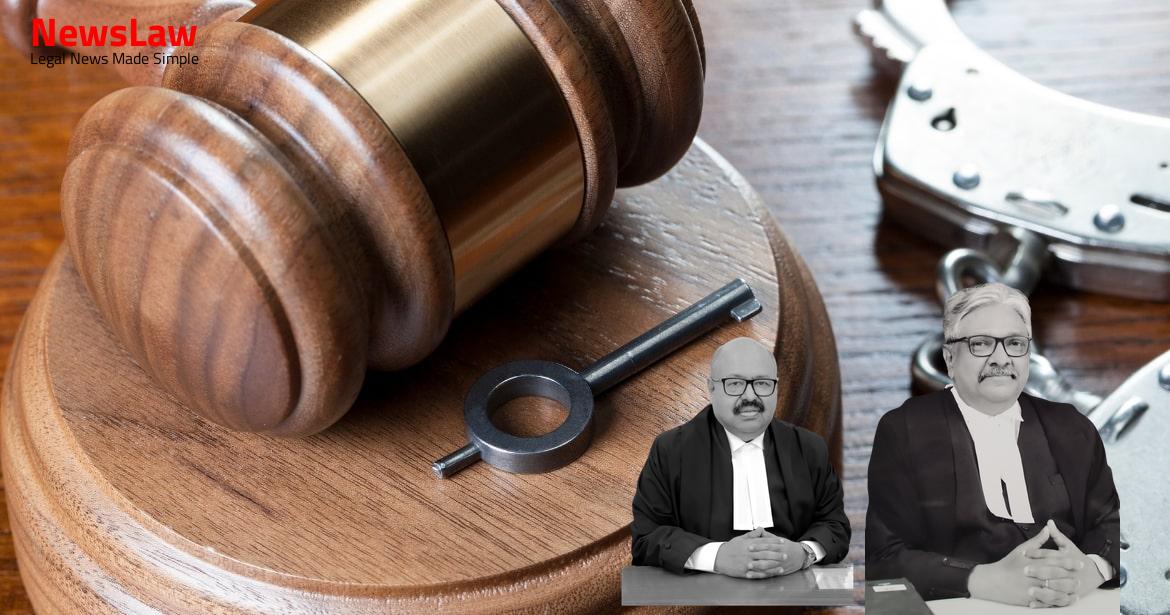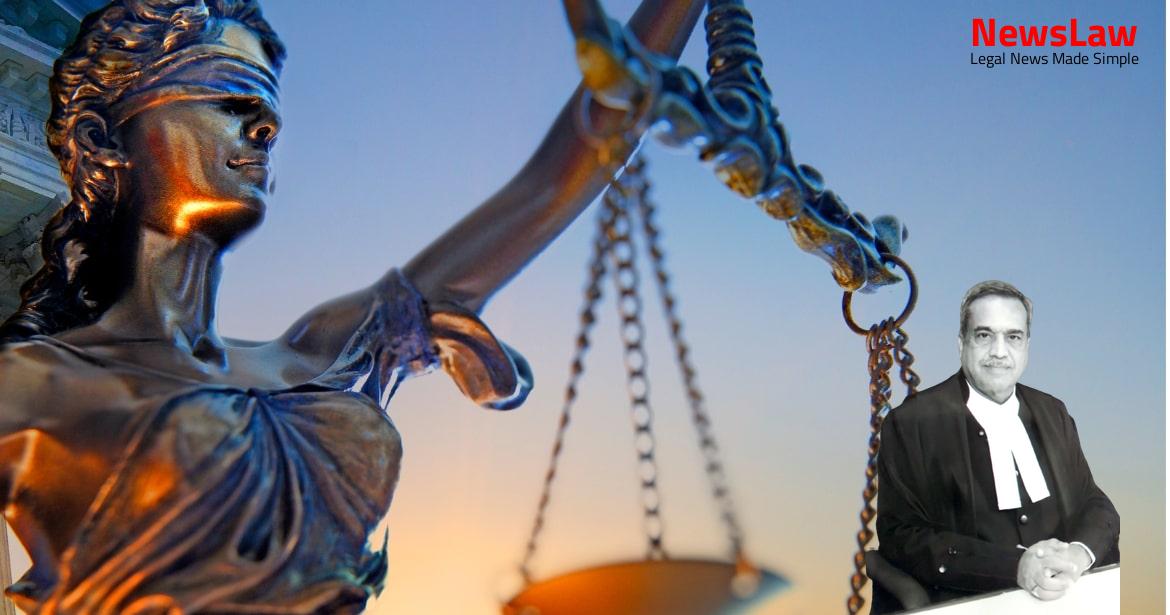The appellant-Bank granted a financial facility to a firm ( M/s. The garnish order passed below Exh.6 is made absolute and the plaintiff is at liberty to execute the award against the G.S.I.C. for the said amount of Rs.1,50,000/- taking due process of law after 31.03.1989. In view of the provisions of Section 103 of the Act, since the order passed under Section 103 of the Act in this case is to be executed in the same manner as a decree of a Civil Court as defined in clause (2) of Section 2 of the Code of Civil Procedure, 1908 (For short ‘CPC’), the appellant initially filed Execution Application No.777/1995 before the City Civil Court, Ahmedabad.
Also Read: https://newslaw.in/supreme-court/c-a-no-008515-008516-2022/
If no effective step is taken till than the darkhastdar- petition will stand automatically dismissed on 27.11.1997.” 6.
According to the appellant-Bank, the said application was allowed and the Execution Application was permitted to be withdrawn by order dated 02.02.2005.
Resuming the narrative with reference to the developments in the suit with which we are concerned, after filing of the execution petition as it were by the appellant in the new Execution Court apparently based on the developments in the other suit namely the holding of the Court auction in connection with the enforcement of the liability of the mother as guarantor, an application came to be filed on 24.01.2007. 2 and 3 thus, your honour may be pleased to pass order of garnishi and direct the registrar/Nazir of the Court of learned Civil Judge (S.D.) Saheb to deposited the remaining credited amount in the said execution. This order has been declared today on this 10.04.2013 in the open Court.” It is this order which came to be challenged before the High Court by the Patel brothers. It is found that the said order dismissing the execution application should have been set aside within a period of 30 days since Section 5 of the The Limitation Act, 1963 is not available in execution proceedings, the subsequent execution petition is barred. In the facts of this case, it was found there was no approach made by the appellant-Bank to the Court in which the execution petition was originally filed to get it transferred to the second Court in which without an order under Section 39, the appellant-Bank filed the second application in the year 2006. It is found that Order 21 Rule 46 of CPC insisting on an order of attachment as is clear from a perusal of Order 21 Rule 46A of CPC serves a salutary purpose. The courts in India have generally taken the view that an execution petition which has been dismissed for the default of the decree-holder though by the time that petition came to be dismissed, the judgment-debtor had resisted the execution on one or more grounds, does not bar the further execution of the decree in pursuance of fresh execution petitions filed in accordance with law-see Lakshmibai Anant Kondkar v. Hence we agree with the High Court that the plea of res judicata advanced by the appellant is unsustainable.” The dismissal of the earlier execution petition on the ground of default will not bar the filing of a fresh execution as 11 long as the second petition is filed within the period of limitation.
The certificate granted under Section 103 of the Act only results in the order passed becoming executable as a decree. — (1) Where the time for making an application to set aside the arbitral award under Section 34 has expired, then, subject to the provisions of sub-section (2), such award shall be enforced in accordance with the provisions of the Code of Civil Procedure, 1908 (5 to 1908), in the same manner as if it were a decree of the court.” We are, thus, unhesitatingly of the view that the enforcement of an award through its execution 13 can be filed anywhere in the country where such decree can be executed and there is no requirement for obtaining a transfer of the decree from the court, which would have jurisdiction over the arbitral proceedings.” He would therefore submit that once second application was not barred by limitation, a fresh execution petition could be filed in the Court which would have jurisdiction. It belonged to the mother and it was lying in deposit and as the mother passed away, therefore, it became payable by the Court’s Nazir to the judgment debtors in the said case two of whom are the judgment debtors being the Patel brothers involved in this case also. He would further submit that 14 with reference to the wide powers available to the Execution Court under Section 51 of CPC that at any rate it would be highly unjust to deny the decree holder the fruits of its decree and to proscribe the Court from getting at assets of the judgment debtors which were lying in a deposit in the same Court. He would point that as far as the interpretation placed under Sections 38 and 39 of CPC by the High Court is concerned it is unexceptionable. This attempt is bolstered with reference to the words ‘decree as defined in clause (2) of Section 2 of CPC’ as found in Section 103 of the Act. He would submit that Order 21 Rule 46 read with Order 21 Rule 46A of CPC and the provisions which succeed these provisions enact a scheme which is intended to safeguard the interest of the garnishee.
Order 21 Rule 52 of CPC, reads as follows: – ORDER 21 RULE 52:- 52.
Also Read: https://newslaw.in/supreme-court/supreme-courts-analysis-on-advocates-on-record-system/
Section 51 of the CPC, inter alia, provides as follows: 51 – 51. The scheme of Order 21 Rule 46 followed by Order 21 Rule 46A may not be available and this may have to be dealt with under Order 21 Rule 52. It was ordered in the award that the appellant would be entitled to execute the said award in realizing the amount which was awarded in favour of the appellant in this case. In other words, what Section 103 of the Act appears to contemplate is that after the adjudication by the Authorities which would include any appeal carried therefrom, the order passed, inter alia, is to be certified by the Registrar or the Liquidator. There is a case for the appellant, no doubt, that the apprehension of the learned counsel for the respondents that if the creditor sleeps over the matter even for a period beyond time provided for executing a decree and makes an application with great delay then it would result in a completely inequitable situation may not rise as the facts speak otherwise.
Transfer of decree.—(1)
The Court which passed a decree may, on the application of the decree-holder, send it for execution to another Court [of competent jurisdiction], — ( a ) if the person against whom the decree is passed actually and voluntarily resides or carries on business, or personally works for gain, within the local limits of the jurisdiction of such other Court, or ( b ) if such person has no property within the local limits of the jurisdiction of the Court which passed the decree sufficient to satisfy such decree and has property within the local limits of the jurisdiction of such other Court, or ( c ) if the decree directs the sale or delivery of immovable property situate outside the local limits of the 20 jurisdiction of the Court which passed it, or ( d ) if the Court which passed the decree considers for any other reason, which it shall record in writing, that the decree should be executed by such other Court. [(3) For the purposes of this section, a Court shall be deemed to be a court of competent jurisdiction if, at the time of making the application for the transfer of decree to it, such Court would have jurisdiction to try the suit in which such decree was passed.] [(4) Nothing in this section shall be deemed to authorise the Court which passed a decree to execute such decree against any person or property outside the local limits of its jurisdiction.] It is clear that under the scheme of the CPC, if a decree is passed by a Civil Court, then either the Court which passed the decree can execute it or the Court to which the decree is transferred can execute the decree. The only point which is raised before us to distinguish the said judgment by the learned counsel for the respondents is that in view of the use of words ‘decree as defined in clause (2) of Section 2 of CPC’, in Section 103 of the Act, the principle may not be available.
This is for the reason that we would think that the words ‘decree as defined in clause (2) of Section 2 of CPC’ as used in Section 103 of the Act is to reinforce in the concept of a decree with greater clarity and by way of abundant caution. Undoubtedly, Order 21 Rule 46A of CPC is part of the scheme of the provisions relating to executions and it must be understood with reference to the reliefs which can be claimed by the decree holder as provided in both Section 51 and Order 21 Rule 11 of CPC. Order 21 Rule 46 apparently deals with attachment of debt, share and other property but an important distinguishing feature is that the debt, share and other property must not be in the possession of the judgment debtor to attract Order 21 Rule 46. ‘A’ owes a debt to ‘B’, ‘B’ in turns owes a debt to ‘C’, ‘C’ can obtain an order of garnishee against ‘A’.
Under Order 21 Rule 46B, if the garnishee does not pay the amount forthwith or he does not appear in the case of a show cause, the Court is empowered to order the garnishee to comply with the terms of the notice. Therefore, it is clear that the lawgiver has contemplated to confer invaluable rights on the garnishee in the form of empowering him to challenge the attachment which is necessarily involved in the order of garnishee under Order 21 Rule 46A of CPC. If the attachment is made under Order 21 Rule 46 of CPC, it would be open to him to question it under Order 21 Rule 58. 46 states that the debtor so prohibited may pay the amount of debt into Court. 46 which compels the debtor to pay the amount of debt into court.
46B, where he fails to pay the amount in Court and also fails to appear and show cause in answer to the notice , the court may order him to comply with the terms of the notice and on such order execution may issue as though such order were a decree against him. The rules do not require him to raise an objection suo motu before receiving a show cause notice under R. It is, however, a well recognised canon of construction that where power is given to a Court or a public officer for the purpose of being used for the benefit of persons to be affected upon the performance of which they are entitled to call for its exercise, the power ought to be exercised to effectuate the purpose for which it was given.
There is a definite scheme as already noticed which is clear from the perusal of Order 21 Rule 46 and by the subsequent additions to the law by the amendment of the year 1976 which is contained in Order 21 Rule 46A to Order 21 Rule 46I. The contention, however, raised by the appellant is that it is not the mother and in fact the appellant was also aware that the mother was not alive as of the date of the making of the application and therefore there could not have been any order against the mother. The said order directed the distribution of the amount fetched in the Court auction in the following manner:- 30 Rs.18,56, 750/- was to be paid to the appellant on account of the deemed decree in Lavad Suit No.576/1988 and Rs. We are not certain as to what has happened to the amount of Rs.6,89,416/- which is earmarked as share of Hemant Balkrushna Patel. We posed the question to the learned counsel for the respondents as to whether apart from the three Patel brothers whether there is any other legal heir. In the facts of this case, the more appropriate order would have been one under Order 21 Rule 52 of CPC. We must bear in mind also the fact that this Court was persuaded to pass an order under which the amount lying in deposit in excess of Rs.12 lakhs was allowed to be withdrawn by the respondents. However, we make it clear that the respondents-Patel brothers had an opportunity to raise objections before the Execution Court and the right which is given under Order 21 Rule 46C is for the benefit of the garnishee.
Also Read: https://newslaw.in/supreme-court/c-a-no-008714-008714-2022/
New Delhi 16th November, 2022
Case Title: BHAGYODAY COOPERATIVE BANK LTD. Vs. RAVINDRA BALKRISHNA PATEL DECEASED. THROUGH HIS LRS (2022 INSC 1210)
Case Number: C.A. No.-008531-008532 / 2022



